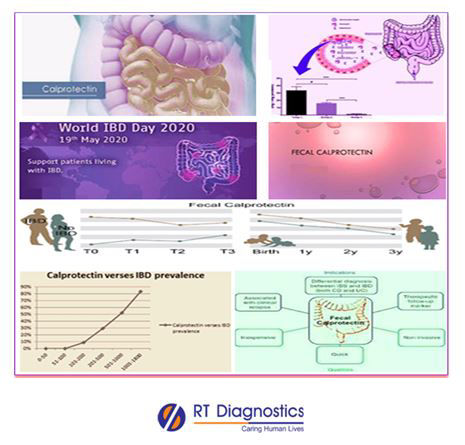CALPROTECTIN:
Why Calprotectin Test?
CLINICAL INFORMATION
Calprotectin is a stool (fecal) test that can be used as a non-invasive tool to identify inflammatory and non-inflammatory diseases. It is an extremely useful and cost-effective marker to help differentiate between Inflammatory Bowel Disease i.e IBD- Crohn’s Disease (UC) and Crohn’s Disease (CD), a long term condition that involves inflammation of the gut or digestive tract, and IBS -inflammatory bowel syndrome (IBS causes cramp-like stomach pains, spasms with bouts of diarrhea and/or constipation). A calprotectin stool test can detect IBD diseases caused by inflammation of the colon like Crohn’s Disease (CD– affects entire gastrointestinal tract or Ulcerative Colitis – UC that affects only the large intestine) and/or inflammations caused by infections (bacterial) and thus can rule out IBS disorders. Hence fecal calprotectin (FC) is used to screen inflammation in the intestines eg inflammatory bowel disease IBD activity – CD (can affect any part of GIT from mouth to anus but predominantly in the small intestine and colon) and UC (different classes of UC depending on location and severity are ulcerative proctitis, universal colitis or pancolitis, proctosigmoiditis, distal colitis, and acute severe ulcerative colitis.). Fecal calprotectin (FC) is a protein synthesized by the leucocytes (WBC’s - neutrophils) and these levels are found to be increased during inflammation of intestinal mucosa which can be detected in the stool sample specimen confirming the intestinal inflammatory activity. This test is also performed in addition to the lactoferrin stool test, a substance that is also released by WBC’s excreted in the stool is found to be associated with intestinal inflammation. The other causes (other than IBD and bacterial infections) that result in high concentrations of calprotectin levels are abdominal pain and cramps, prolonged chronic diarrhea, ischemia (mesenteric artery to the colon), celiac disease, polyps, gastritis, gastric ulcers, esophagitis, diverticulitis, gastric & colorectal cancers and constant use of high NSAIDs (non-steroidal anti-inflammatory medications). Risk factors for IBD – UC are age, ethnicity, and genetics and the risk factors for CD are diet, smoking, genetics, and medications. Clinical manifestations are frequent bouts of watery and/or bloody diarrhea, abdominal pain, rectal bleeding, weight loss, weakness, and fever. Complications of CD are bowel obstruction, colon cancer, fistulas, anal fissures, ulcers in mouth, intestines, anus, and perineum, and between genitals and anus. Complications of UC are rectal bleeding leading to anemia, dehydration, poor absorption of nutrients, reduced bone density leading to osteopenia or osteoporosis. Other tests include a blood test (anemia and infection), ESR and CRP test (Inflammatory markers), stool culture to detect a bacterial infection, test for ova and parasites, a stool white blood cell test and/or fecal occult blood test, endoscopy (upper endoscopy to examine the esophagus, stomach and the first part of the small intestine, colonoscopy to examine the entire colon and/or flexible sigmoidoscopy to check the final section of the colon) and/or capsule endoscopy and tissue biopsy for histo-pathological studies (confirmatory test), MRI and/or CT scan to detect fistulas in the small intestine or anal region.

General Instructions:
Sample Requirement: Specimen - stool sample (fecal specimen) collected for test. Test Preparation: None.
NOTE - Sample for specimen collections may vary based on the patient’s condition/cases according to the patient’s presenting complaints/signs or symptoms:
SPECIMEN REQUIREMENT (Special or Rare Cases) - As instructed and guided by Physician / Clinician / Pathologist / as per Laboratory’s requirements, according to procedures and protocols.
Sample Requirement: Stool
Test Preparation: None
This Multi-Specialty Clinical Referral Laboratory RT DIAGNOSTICS provides precise and accurate tests with an extensive range of testing services to the medical centers to help in the diagnosis and identification of pathology in the test specimens for infectious diseases and also to evaluate the function of organ systems of the patient. It prevents further complications and helps to stabilize and restore health to near normalcy at the earliest without delay.



